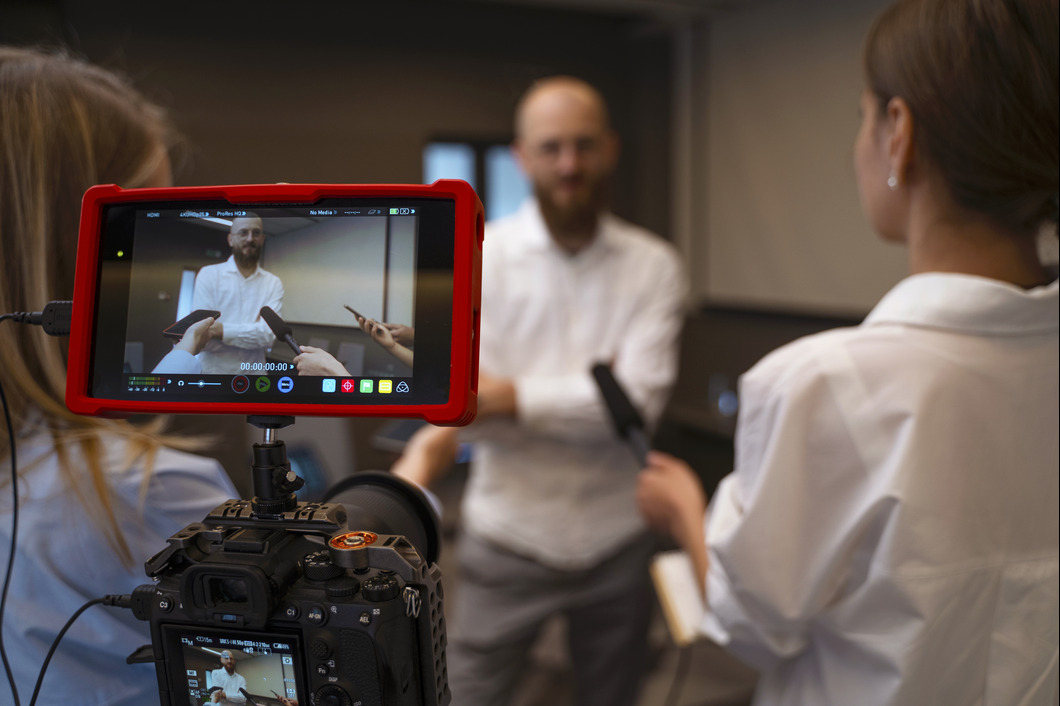The Value of Legal Video Depositions in Modern Legal Services: What You Should Know
Lawful video clip depositions have ended up being vital in today's legal landscape. They provide a multidimensional sight of witness testaments that standard transcripts simply can not match. By recording both spoken and non-verbal communication, these depositions boost the total understanding of a witness's reputation. Nevertheless, the performance of video clip depositions rests on various variables, consisting of compliance with lawful standards and ideal techniques (legal video depositions). Discovering these aspects reveals their real significance in modern-day legal solutions
What Are Lawful Video Depositions?
Legal video clip depositions offer as a vital device in the litigation process. They include taping witness testaments in a video clip format, capturing both non-verbal and verbal communication. This technique enables lawyers to record the demeanor, expressions, and reactions of witnesses, offering a richer context for the testimony. Generally carried out in a controlled setting, these depositions are led by lawyers that ask inquiries while a stenotype reporter documents the discussion. The resulting video clip can be crucial for trial prep work, as it makes it possible for lawyers to assess the reliability of witnesses and refine their techniques. Additionally, legal video clip depositions can be made use of in numerous lawful contexts, varying from civil disagreements to criminal instances. The aesthetic and auditory components of video depositions enhance the presentation of proof, making it a crucial part in the contemporary legal landscape. Overall, they add significantly to the effectiveness and effectiveness of lawful procedures.

Benefits of Video Depositions Over Typical Methods
Video clip depositions offer many benefits compared to standard methods of taking witness statements. One substantial benefit is the capability to record both visual and audio components, providing a much more detailed record of the witness's statements. This twin layout enhances clearness and permits lawful professionals to reference certain subtleties throughout test preparation. Additionally, video depositions assist in remote engagement, making it easier for witnesses who may be not available for in-person looks as a result of geographical restraints or health issues.Moreover, video depositions can speed up the general deposition process, minimizing the moment and expenses related to traveling and logistics. They additionally boost access, as recorded depositions can be easily shared among lawful groups and referenced at any kind of time. This ease adds to better situation administration and preparation. In general, video depositions stand for a modern-day, reliable strategy to collecting witness statements, lining up with the developing needs of the lawful career.
The Function of Body Language and Tone in Testimonies

In legal video clip depositions, body movement and tone play important duties in conveying a witness's credibility and trustworthiness. Nonverbal signs can provide insights right into a witness's emotion, affecting how their testament is viewed. Understanding the effect of these elements is crucial for jurors and lawyers alike when examining the reliability of a statement.
Nonverbal Interaction Insights
While verbal interaction is frequently stressed in legal statements, nonverbal cues such as body language and tone play an essential function in sharing reliability and feeling. Observers of depositions may keep in mind that a witness's posture, gestures, and faces can greatly influence understandings of integrity. For instance, constant eye call may signal confidence, while staying clear of gaze could suggest deceit or pain. Likewise, the intonation-- its pitch, speed, and quantity-- can impart feelings of sincerity or uncertainty. Legal professionals must be attuned to these nonverbal signals, as they frequently offer vital context that matches spoken words. Understanding these subtleties can boost the performance of depositions and affect the result of legal proceedings.
Emotional Tone Influence
The psychological tone communicated during legal testaments substantially affects exactly how a witness is perceived. Body movement, vocal inflections, and face expressions play essential functions fit the narrative of a testament. A witness displaying confidence via constant eye get in touch with and a calm tone can infuse a sense of reliability and involvement. On the other hand, signs of anxiousness, such as fidgeting or an unstable voice, may cause apprehension regarding their account. The nuances of emotional expression can influence the analysis of facts, making it necessary for legal specialists to acknowledge these hints. In video depositions, the auditory and visual elements incorporate, emphasizing the relevance of emotional tone in sharing sincerity and reliability within the legal process.
Integrity and Credibility
An important consider developing integrity and dependability during testimonies hinges on the witness's body movement and tone of voice. Observers usually rely upon non-verbal hints-- such as eye call, posture, and gestures-- to assess a witness's sincerity. As an example, a witness who keeps eye get in touch with and displays open body movement might be viewed as even more truthful and trusted than one Full Article who avoids eye get in touch with or shows up shut off. Furthermore, tone of voice plays a vital role; a stable, calm tone can reinforce the trustworthiness of the statement, while changes in pitch or volume may raise doubts. Inevitably, the mix of body language and singing tone substantially affects exactly how a witness's statements are received and interpreted in a lawful context.
Ideal Practices for Carrying Out Video Depositions
Conducting video clip depositions calls for cautious planning and implementation to ensure a clear and efficient presentation of testament. It is essential to choose a silent, well-lit place to minimize disturbances and safe optimal video clip quality. The tools ought to be tested in breakthrough, including electronic cameras, microphones, and illumination, to avoid technological issues throughout the deposition.Next, parties included must examine the format and procedures ahead of time, making sure that every person understands their duties. The deponent should be informed on the procedure, including exactly how to react clearly and concisely.Additionally, preserving a professional behavior throughout the session is essential. This includes avoiding speaking over one another and verifying that all inquiries are directed properly. It is essential to record the deposition in a style that enables for very easy playback and testimonial, maintaining the integrity of the testimony for future use.
Legal Considerations and Compliance Issues
Exactly how do legal considerations and compliance problems affect the efficiency of video clip depositions? Lawyers have to browse an intricate landscape of laws, making certain that video clip depositions stick to administrative regulations and criteria. Conformity with regulations worrying privacy, permission, and tape-recording methods is important. Acquiring explicit authorization from all celebrations included is necessary to stay clear of lawful repercussions.Additionally, the admissibility of video proof in court can pivot on compliance with step-by-step needs. Making certain that the equipment used fulfills technical standards is additionally essential, as poor top quality can weaken the deposition's reliability.Moreover, attorneys need to recognize any kind of certain state laws that control video depositions, as these can differ significantly. Failing to deal with these considerations can not only jeopardize the honesty of the deposition yet additionally influence the general situation strategy, ultimately impacting the client's lawful outcomes.
Exactly How Video Depositions Effect Court Perception
While video clip depositions can function as powerful devices in lawful procedures, their impact on court perception is substantial. The acoustic and aesthetic elements of video recordings give jurors with a more detailed understanding of witness behavior, reliability, and emotional feedbacks. This multimedia approach can improve the jurors' capacity to analyze the reliability of statement contrasted to typical text-based transcripts.Moreover, video clip depositions allow jurors to observe body language, tone of voice, and facial expressions, every one of which can affect their analysis of the witness's declarations. The visibility of a witness on display can humanize them, fostering empathy and connection, which may sway jurors' opinions. On the other hand, a witness that shows up incredibly elusive or unreliable on video clip might cause adverse assumptions that affect a court's decision. Eventually, the dynamic nature of video depositions plays an important role fit how jurors interpret evidence and reach their judgments.
The Future of Video Clip Depositions in Legal Technique
As innovations in modern technology proceed to reshape the legal landscape, the future of video clip depositions is positioned for considerable development. Developments such as expert system, digital fact, and improved video conferencing tools are anticipated to enhance the deposition process and improve ease of access. Legal specialists may utilize AI-driven analytics to assess witness reputation and instance stamina more effectively.Moreover, the assimilation discover here of online reality can enable courts to experience immersive simulations of depositions, supplying deeper context and understanding. In addition, the pattern towards remote depositions is likely to persist, using greater adaptability for attorneys and customers alike.As remote work comes to be progressively stabilized, video depositions will likely come to be conventional practice, minimizing costs and time restrictions connected with standard methods. Generally, these technological improvements assure to improve the performance, effectiveness, and availability of video clip depositions in legal method, inevitably transforming exactly how legal specialists prepare for test.
Frequently Asked Concerns
Just How Much Do Legal Video Clip Depositions Typically Expense?

Can Video Depositions Be Utilized in Any Sort Of Instance?
Video clip depositions can be used in various kinds of instances, consisting of civil, criminal, and household law. Their flexibility permits attorneys to present witness testaments properly, adapting to the certain requirements of different lawful circumstances.
What Equipment Is Required for a Video Deposition?
To conduct a video clip deposition, vital equipment consists of a top notch video camera, microphone, lighting, and a trusted recording gadget. Additionally, a computer system with editing software program may be essential for post-production and formatting the final video clip.
For how long Does a Normal Video Clip Deposition Last?
A normal video clip deposition lasts between 2 to four hours, depending upon the complexity of the situation and the variety of questions presented. Extended sessions may take place, but breaks are normally incorporated for participant convenience.

Are Video Depositions Admissible in Court?
Video depositions are normally permissible in court, given they follow lawful criteria and regulations of proof. Their usage boosts quality and maintains witness testament, assisting in the judicial procedure during trials and hearings. Legal video clip depositions have actually come to be crucial in today's lawful landscape. Furthermore, legal video depositions can be utilized in numerous lawful contexts, varying from civil conflicts to criminal cases. Additionally, video clip depositions promote remote involvement, making it much easier for witnesses who may be inaccessible for in-person go to website looks due to geographical restrictions or health issues.Moreover, video clip depositions can accelerate the general deposition process, lowering the time and expenses associated with traveling and logistics. Making certain that the devices used fulfills technical standards is additionally essential, as poor high quality can undermine the deposition's reliability.Moreover, attorneys have to be conscious of any details state legislations that govern video clip depositions, as these can vary substantially. Furthermore, the fad toward remote depositions is most likely to continue, supplying higher adaptability for clients and lawyers alike.As remote job ends up being significantly normalized, video clip depositions will likely become typical practice, lowering expenses and time restraints linked with typical techniques.